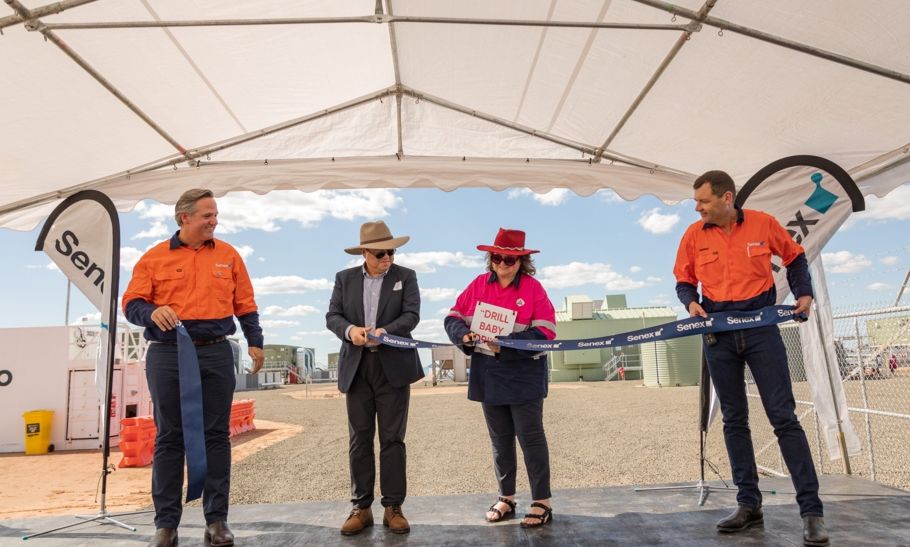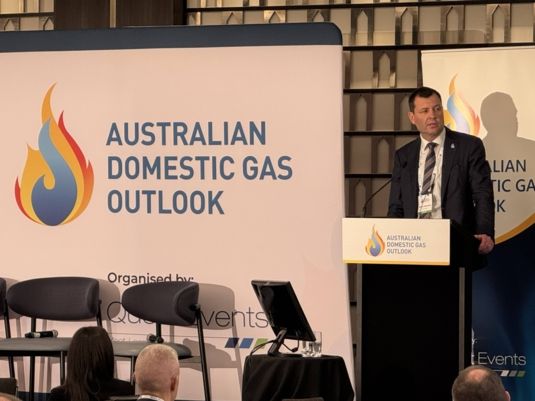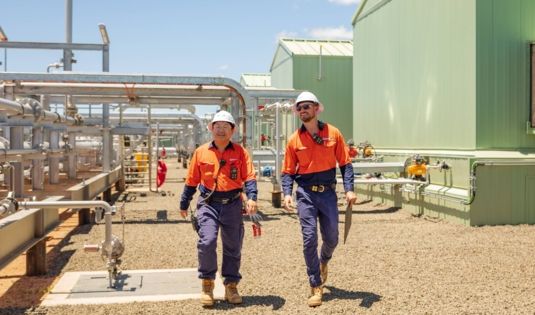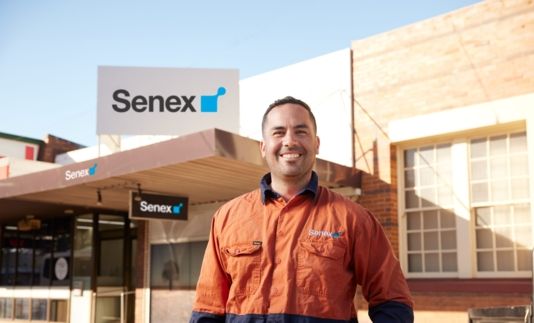First gas is set to flow from Senex Energy’s $1 billion Atlas natural gas field expansion following the official opening (Sunday 24 November 2024) of the Surat Basin processing facility in Queensland.
Senex Energy shareholders, represented by POSCO International Corporation CEO Kyein Lee and Hancock Prospecting Executive Chairman Mrs Gina Rinehart AO were there to mark the significant milestone alongside representatives from all levels of Government and the Wandoan community.
The opening marks a significant milestone in delivering critical gas to the east coast market at a time when the Australian Energy Market Operator (AEMO) is predicting shortfalls in coming years.
Senex Energy CEO Darren Stevenson said, as promised, the project is being delivered with the expansion of Atlas and Roma North gas developments to deliver 60 petajoules (PJ) per year.
“Senex’s founding CEO Ian Davies had the vision for this ambitious project and transforming Senex into a material east coast natural gas producer, and today I’m proud to be carrying that vision forward into reality,” Mr Stevenson said.
“To date, we have drilled more than 160 wells, completed construction of the Atlas to Reedy Creek pipeline and the first stage of the processing facility, with gas flowing and commissioning underway. Consumers will see new critical supply delivered to the east coast market early in 2025.
“This is welcome news for households and manufacturers with Senex Energy keeping its promise to supply more, reliable natural gas to power our economy and support energy security,” Mr Stevenson said.
Jobs and economic win for Queensland
The project has delivered an economic boost with 95 per cent of the $1 billion project spent within Australia and almost half directed to Queensland.
The investment has created nearly 1,000 jobs, including 700 during construction and 200 ongoing. More than 1.7 million work hours have been logged. The project is expected to inject more than A$200 million into local businesses and communities.
“This does more than power our energy sector. It delivers long term economic benefits to Queenslanders with royalties from this multi-decade investment helping fund hospitals, roads, and emergency services,” Mr Stevenson said.
Certainty for manufacturers and households
Once this expansion reaches full capacity, the Atlas and Roma North developments will supply up to 60 petajoules of natural gas annually, representing over 10 per cent of the annual domestic natural gas demand on the east coast.
Gas provides around 40 per cent of energy used for manufacturing in Australia and helps drive a $100 billion industry that employs 890,000 people.
“Natural gas is fundamental for Australian manufacturing, providing the high heat and feedstock required for many critical processes that manufacturers rely on to produce everyday consumer products from bricks and bottles to plasterboard and steel,” Mr Stevenson said.
Manufacturers including Orora, Bluescope, Visy and CSR all rely on Senex Energy to help meet the increasing demand for natural gas.
Energy security for Australia
“We are again seeing Queensland continue to do the heavy lifting in natural gas production. This $1 billion expansion demonstrates what can be achieved when industry, government, regulators, landholders, community and suppliers work together to unlock critical resources,” Mr Stevenson said.
“The Atlas expansion is a win for Queensland, a win for energy security, and a win for a market that needs reliable natural gas to flow to factories and households,” he said.
“Senex Energy is committed to ramping up production in 2025, bridging the energy transition, and supporting intermittent renewable energy by providing a reliable, firming supply to replace aging coal generation.
“Senex’s success with the Surat Basin expansion sends a signal to the market that natural gas continues to have an important role to play in the energy mix.
“Natural gas is essential for Australia’s continued prosperity, and we need continued investment and development of natural gas supply to deliver essential energy for life,” Mr Stevenson said.
Quotes attributable to Senex Energy shareholders:
POSCO International Corporation President and CEO, Kyein Lee:
“When we decided to acquire Senex Energy, we were confident in the value of natural gas, strong economics, and political stability in Australia, and today we affirm our decision was correct.
“Natural gas will continue to play an important role in the energy transition, not only in Australia but also globally.
“This is only the beginning, and we will witness more success as Senex Energy expands.”
Hancock Prospecting Executive Chairman, Gina Rinehart AO:
“Natural gas is critical to Australia’s energy security and to providing reliable electricity for Australian homes and businesses. Today is a noteworthy day, because after difficult times and delay to be able to make this more than $1 billion investment alongside our partner, POSCO, Hancock is one of increasingly few companies investing in large projects in Australia. Investment flow, due to government policies and despite Australia’s plentiful supply of resources, is currently going the other way. This investment will triple Senex’s production from 2022 levels, providing additional gas supply that Australians urgently need.”
Quotes attributable to Shadow Minister for Resources, Senator McDonald:
Senator McDonald, Shadow Minister for Resources, welcomed Senex’s gas field expansion opening, hailing the imminent delivery of new natural gas supply to the domestic market.
More gas supply is urgently needed on the east coast to keep the lights on, drive down energy prices and drive up employment.
There is a clear future for the gas sector which underpins almost a fifth of Australia’s electricity network and is critical for the manufacturing sector, from the production of building materials to essential medicines.
We must bring more of our abundant gas reserves into the domestic market and quickly, just as Senex Energy is doing today.
That means the issuing of more exploration permits, greater releases of acreage and greater investment in gas infrastructure.



